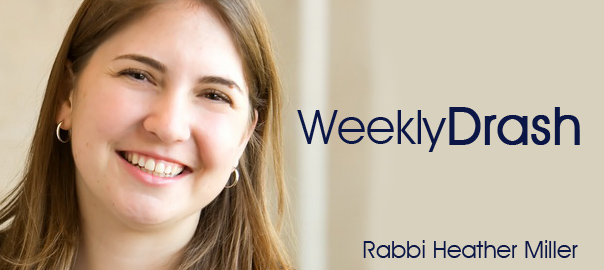Family Matters- A Drash on Parashat Ki Teitzei

By Rabbi Heather Miller
I didn’t have a bat mitzvah ceremony at age 13. Instead, I waited until I had two years of formal Jewish education, and then I had a b’nai mitzvah ceremony with my brother when I was 15 and he was 13. Throughout our studies, our b’nai mitzvah tutor always would say, “EVEN STEVEN!” As in– you will chant the blessing before the haftarah, and your brother will chant the blessing after the haftarah– EVEN STEVEN!” And, you will chant the first 15 verses and she will chant the second 15 verses- EVEN STEVEN!” And, “You will chant the Asher Yatzar and he will chant the Elohai Neshamah– EVEN STEVEN!”
And, no, my brother’s name is not Steven. It is Jordan.
Do you know families like this, where they make sure siblings are given exactly the same amount of resources?
My father in law had a unique family situation growing up where some of the siblings were adopted by an aunt and they got double inheritance though they didn’t live with their other siblings. This inequity seems to be the source of his insistence that Melissa and her sister are treated exactly equally in terms of resources. Exactly equally.
I always assumed that equal treatment of children was ideal. I still do actually. That’s why I was so surprised to read in this week’s Torah portion, Ki Teitzei, that the firstborn is supposed to get a double portion! I know the firstborn children here tonight just sat up in their chairs just a little taller.
Deuteronomy 21:15-17 reads,
“If a man has two wives, one loved and the other unloved, and both the loved and the unloved have borne him sons, but the first-born is the son of the unloved one—
when he wills his property to his sons, he may not treat as first-born the son of the loved one in disregard of the son of the unloved one who is older. Instead, he must accept the first-born, the son of the unloved one, and allot to him a double portion of all he possesses; since he is the first fruit of his vigor, the birthright is his due.”
Why? How? What repercussions might this have?
This inheritance right is called mishpat ha-bekhorah, “the rule of the birthright.”
Though the firstborn may have benefitted doubly after a parent’s death, it seems he was made to work for it. For example, in Levitical families, a firstborn son would often be in charge of or look after his brothers. Same with the firstborn daughters who had to look after her sisters.
If you are a firstborn, you know what I mean.
You may also know of the rite of redeeming the first born son? That ceremony called “Pidyon ha-Ben”? This tradition came about because first born sons of Temple families, the Levitical families, the priestly families, would be compelled to service. They have to be redeemed for five silver coins– a cheap price for their freedom, it seems.
What I find personally the most fascinating about the laws of mishpat ha-bekhorah is that there are commentaries upon commentaries about the firstborn status. The questions they asked: Does it describe the first born of the father? Or the first born of the mother? What if the person was born to a priestly father but Israelite mother, or vice versa? What about cases of polygamy? Who is the firstborn son? What if that son is not acknowledged by the father either because he doubted his paternity or anything else?
There are so many questions that our tradition asks. And for this, I am grateful. Not only to be part of a tradition that punctiliously tries to thoroughly write law, to figure out the most ethical way to behave in any given situation, but one that considers a great variety of family constellations.
It seems that there is not one family “norm.” And, though this portion talks a lot about rules and regulations, it also acknowledges that there are many ways to make a family and many ways to consider children.
Of my brother and me, I am the oldest, but then if you count our step-siblings, two of the three of them are older than me, but my younger half-sister is the firstborn of her mother, and my younger half-brother is the youngest of all. It is complex. And messy. And, so Jewish!
In our own congregation, we have so many ways that love makes a family– two moms, two dads, a single parent, gender-queer adults to children, parents of adult children, grandparents to children, couples, singles, we have bio dads and multigenerational households and friends who are really more like family and so many more. But the one thing that makes a family– is the love that binds it. Not just regular love, but that Jewish concept of chesed— lovingkindness, which is a love bound up with the sense of duty and responsibility.
And, so, too, this has become a congregational family–through chesed— a great conglomeration of people who are bound by sacred and covenantal duty, love and trust of one another. A family of people who share affinity for one another and who challenge one another to live up their shared ideals and values; a family in the best sense of the word. If you are new here tonight, let me invite you to ask the members here how BCC has been like a family to them. And let me invite each of you to share how BCC is like a family to each of you. And may we all count our blessings. Amen!




